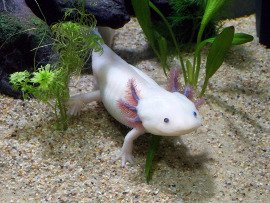 There is a growing demand for axolotls as pets, and for good reason. They’re extremely cute, hardy, and as far as exotic animals go, they’re very easy to take care of. This can make Axolotls an ideal exotic pet for people of all ages, from children to seniors.
There is a growing demand for axolotls as pets, and for good reason. They’re extremely cute, hardy, and as far as exotic animals go, they’re very easy to take care of. This can make Axolotls an ideal exotic pet for people of all ages, from children to seniors.
What is an Axolotl?
Pronounced “ak-suh-laa-tul”, these cute little guys are a large breed of salamander native to Mexico. Axolotls are water dwellers, and require a large, deep tank to live happily and comfortably.
Like Betta fish, there is a common misconception that axolotls are more content in smaller tanks. The minimum recommended aquarium size for a single axolotl is 10-20 gallons.
Until recently, axolotls have not been an easy pet to come by. Due to their increasing popularity, pet retailers everywhere have jumped on this trend and are now selling them more regularly. Axolotls are most commonly sold in certain pet retail chain stores, big box pet stores, as well as more specialized exotic reptile stores.
As easy as axolotls are to care for, they do have specific lifestyle requirements that need to be met in order to stay healthy. Axolotls commonly live up to ten years, however they have been known to live more than twenty years. In addition to a properly-sized aquarium, axolotls need plenty of fresh water to swim in since they do not crawl on land, despite having tiny legs. Axolotls are amphibians, and spend their entire lives in water. Their underwater environment should have plenty of sand, rocks, plants and places to hide.
Water temperature is an important factor, as axolotls do best in cool water. Many aquarium setups require a water cooler to ensure temperatures stay within a healthy range. The most ideal water temperature for an axolotl ranges from 60-70 degrees Fahrenheit. Temperatures above 75 degrees Fahrenheit are too warm and may result in health problems. Axolotls produce more waste than most fish, so the aquarium filter will need to be changed more frequently.
Young axolotls require dim lighting, whereas mature axolotls do well with brighter light, proving they have dark places to hide when needed.
In terms of diet, axolotls love to eat bloodworms, bait worms, feeder fish, and even hamburger meat as a treat. They are carnivores, and need to eat meat in order to stay healthy.
Where Do Axolotls Come From?
While it’s easy to get caught up in how cute these little fellas are, there’s a darker side to keeping axolotls. Axolotls only come from one place in the world: the canals of Xochimilco, Mexico. Because they’ve become such a trendy pet in recent years, their native population is currently facing extinction. In fact, there’s so few axolotls left, it is nearly impossible to find them in their natural, wild habitat.
As little as a decade ago, fishermen could cast nets into the water of the Xochimilco canals, and pull up dozens of axolotls every time. Now, locals claim they haven’t seen any for years. No one knows for sure if their wild population has been entirely wiped out.
Wild axolotls are nearly impossible to find, however there are hundreds of breeders around the globe who breed them for pets, as well as for biomedical research. Because of their unique abilities to heal, including regenerating entire lost limbs, axolotls may pave the way towards advances in modern medicine.
Trendy Pets Are Dangerous For EcoSystems
The axolotl is just one example of an exotic animal becoming a trendy pet, causing them to all but disappear from the wild. These trends can have a catastrophic impact on an animal’s native ecosystem, and in many cases results in irreparable damage.
With that said, I do not agree with any pet store selling live pets, unless it is an adoption partnership with an animal rescue or shelter, because animals should never be used as inventory.
In an ideal world, pet stores that choose to sell exotic animals should be mandated to do their research first, to ensure the animals they’re selling come from professional, reputable breeders. Serious consideration needs to go towards supporting breeders that have a full understanding of proper care and humane handling/breeding practices, in addition to the environmental implications that come with perpetuating ownership of certain exotic pets.
Whether it’s a dog, cat, bird, or axolotl, all pets require specific care, and responsible pet ownership begins with having the right information to make informed choices. There is no doubt exotic animals like axolotls can make for some very unique pets; we just need to make sure we are asking the right questions, and giving consideration to the environmental implications that come from owning certain pets.
Brandon Forder, known as The Pet Expert, is vice-president of Canadian Pet Connection, an industry leader in healthy pet lifestyles. Brandon holds multiple certifications in pet nutrition, and has more than twenty-five years’ experience specializing in pet health and behaviour. He has written hundreds of informative pet-related articles for newspapers, magazines, radio, and the popular Ask the Pet Expert Blog. Brandon is highly skilled in pet problem solving, and enjoys teaching others about smart and responsible pet ownership. To learn more, visit www.CanadianPetConnection.ca.












